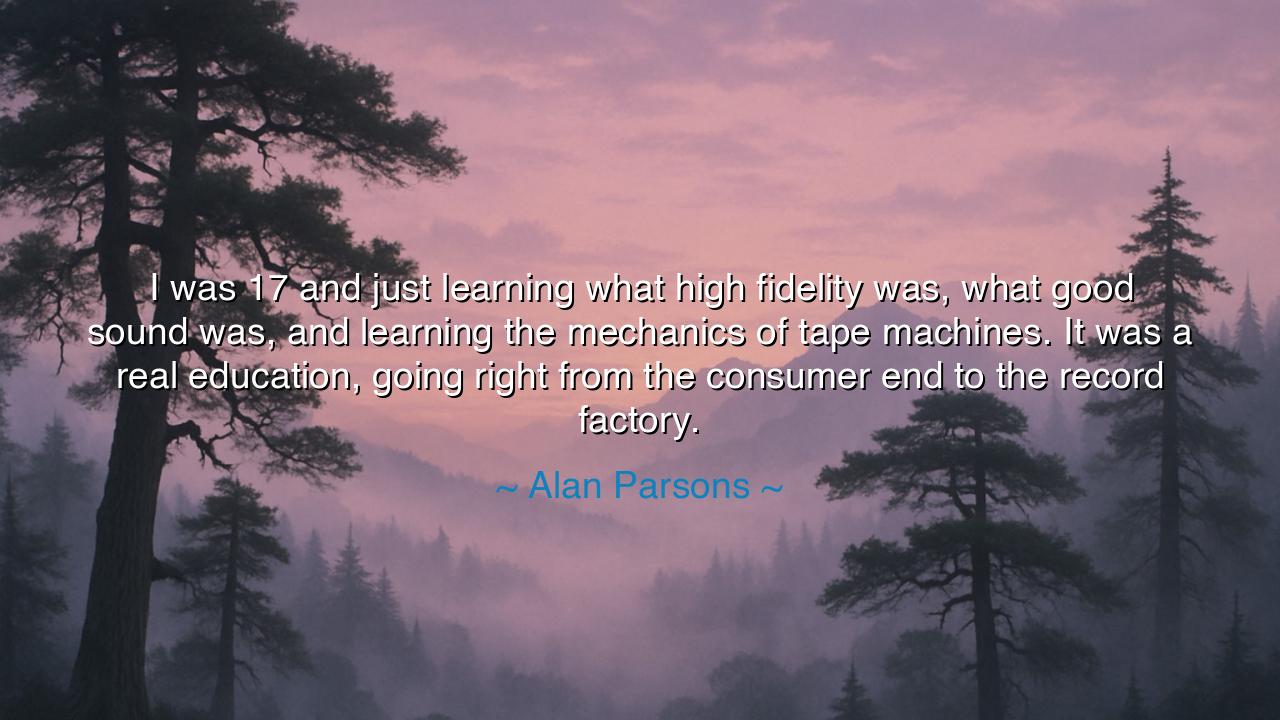
I was 17 and just learning what high fidelity was, what good
I was 17 and just learning what high fidelity was, what good sound was, and learning the mechanics of tape machines. It was a real education, going right from the consumer end to the record factory.






Hear, O listeners, the recollection of Alan Parsons, craftsman of sound and visionary of music, who declared: “I was 17 and just learning what high fidelity was, what good sound was, and learning the mechanics of tape machines. It was a real education, going right from the consumer end to the record factory.” In this memory lies not only the story of a young man’s apprenticeship, but also the eternal pattern by which mastery is gained—through curiosity, through hands-on labor, and through the courage to pass from mere consumption into creation.
The meaning of his words is clear: there is a difference between hearing and understanding, between enjoying and creating. As a consumer, Parsons delighted in the music, as all do. But when he entered the factory, when he began to learn the gears and reels of the tape machines, he crossed a threshold. He no longer simply received sound; he began to shape it. This is the deeper education—to move from the surface of experience into the depths of knowledge, from being a listener to becoming a maker.
Consider the example of the great inventor Thomas Edison. As a boy, he sold newspapers and candies on trains, a consumer of the world’s goods. Yet his true transformation came when he built his own laboratory, taking apart machines, experimenting, failing, and trying again. By learning the mechanics of the world around him, he became a creator of wonders—the phonograph, the electric light, the motion picture. Like Parsons, he understood that true education is not abstract, but lived, tested with one’s own hands.
So too in the Renaissance did Leonardo da Vinci follow this path. He was not content to gaze upon paintings or read books alone. He dissected the bodies of men and animals, sketched the turning of gears, and studied the flight of birds. His genius was not born of consumption but of exploration. He too went from the “consumer end” of experience to the “factory” of creation, transforming observation into innovation. Thus Parsons’ words echo an ancient truth: that mastery comes through the marriage of wonder and work.
The wisdom of this quote lies in its humility. Parsons did not begin as a master of sound; he began as a youth with an ear for music and a hunger to understand. At 17, he admits, he was only just learning what “good sound” truly was. But he cherished that beginning, knowing that each reel of tape, each mechanical hum of the machine, was part of his great apprenticeship. His story is a testament to the truth that education is not confined to schools, but is found wherever curiosity meets practice.
The lesson, O listener, is this: if you would master a craft, do not remain only at the level of consumption. It is not enough to admire the painting, to enjoy the music, to read the story. You must step into the factory—into the workshop, the studio, the place where creation is hard and messy. There you will gain the education that transforms you from admirer to maker. Only then will you understand not only the product, but the process, and through process, discover your own power.
Practical action lies before you: when you love a thing—be it art, music, science, or craft—do not stop at enjoyment. Ask how it works. Take it apart. Study its mechanics. Learn from those who create, and then begin to create yourself. In doing so, you will find that the greatest education is not memorized in books alone, but lived through practice, experiment, and persistence.
Thus remember Alan Parsons’ words: at 17, he crossed from consumer to creator, from listener to engineer. This is the path of growth for all who seek mastery. Cherish your curiosity, embrace the labor of learning, and step boldly into the workshop of life—for there, and only there, shall your true education begin.






AAdministratorAdministrator
Welcome, honored guests. Please leave a comment, we will respond soon